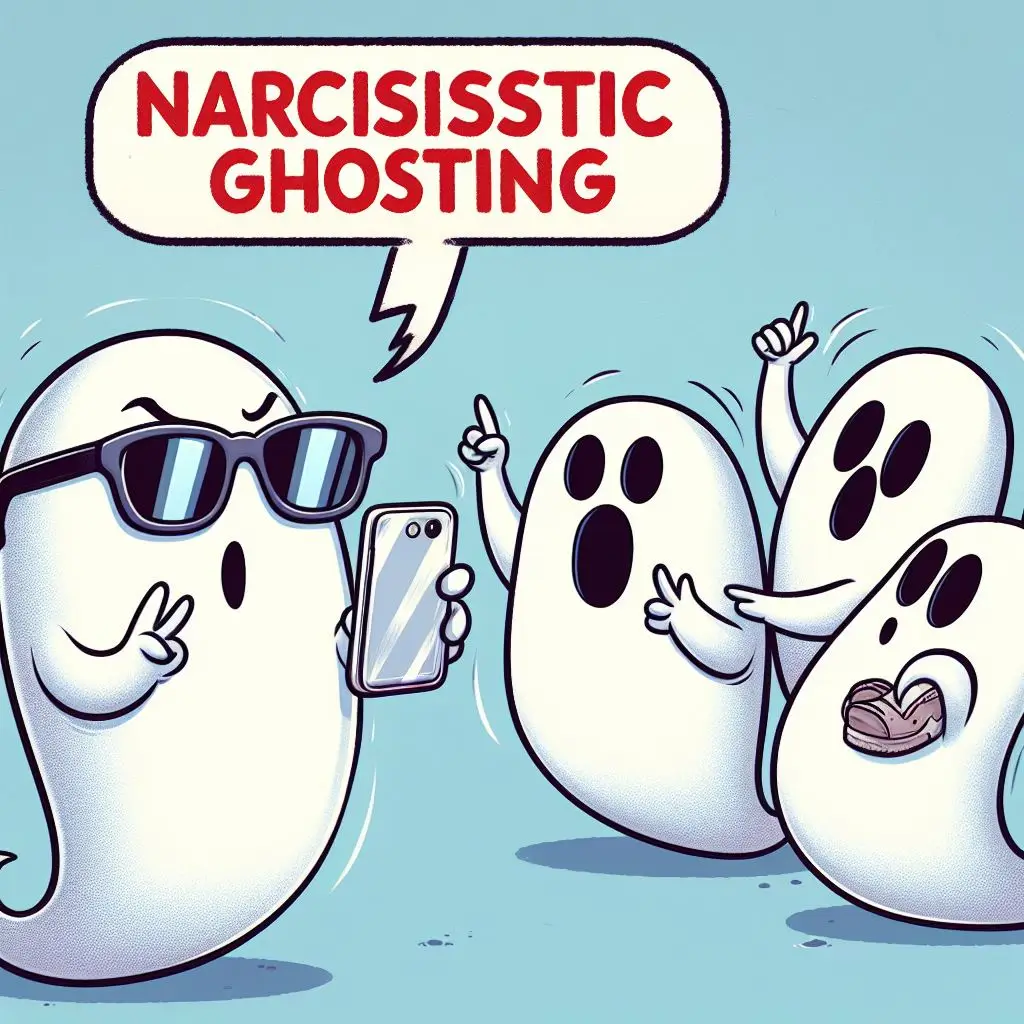Have you felt that sudden sting – the profound shock of someone leaving without a reason? It’s like being erased from their world, as quick as turning off a light. Narcissistic ghosting isn’t just a quiet exit. It’s a jarring disappearance from someone you cared about. A void is left, filled with gnawing questions about self-worth and reality.
How do you know if you’re a narcissistic ghosting victim? Thinking about this could help recognize a sinister pattern, masked by love and trust.
“Narcissistic ghosting psychologically abuses victims, making them question reality, worth, and sanity. Narcissists use it for power and control, devastating self-esteem and ability to trust.”
Dr. Elise Stevens, Clinical Psychologist and Relationship Expert
In romantic relationships, narcissist ghosting means more than lack of closure. It reflects a calculated withdrawal to cause confusion and pain. The ghoster vanishes not just physically, but from all communication – leaving silence where companionship was.
Understanding this is complex. At its core, disappearing declares dominance – a unilateral decision stripping respect and consideration. Motives are intricate – avoiding confrontation, inability to genuinely attach, or narcissist’s perceived superiority.
Abrupt departures leave deep marks. It is feeling abandoned and confused. Questions swirl, unanswered. People doubt themselves when relationships end without reason. Hurt hearts try to grasp what happened. But answers are gone. There is a void.
In this blog post, we will discuss what is narcissistic ghosting? Is It Common for Narcissists to Ghost? Do Narcissists Come Back After Ghosting? How To Respond To Narcissistic Ghosting?
What is Narcissistic Ghosting?

Narcissistic ghosting is a narcissist’s underhanded tactic to inflict emotional damage. They abruptly withdraw attention, leaving victims confused, pained, discarded. It transcends romantic ties, occurring in friendships, families, workplaces.
Narcissistic ghosting deeply impacts emotions. Victims often feel betrayed, low self-worth, and confused when someone cared for vanishes abruptly from lives. Deliberateness amplifies pain, showing callous disregard for victim’s feelings and emotional wellbeing.
As victims cope with narcissistic ghosting aftermath, recognizing narcissists’ manipulative tactics and finding coping, healing strategies becomes crucial. Understanding these dynamics helps regain self-worth and move towards healthier future.
Key Points:
– Narcissistic ghosting is manipulative tactic by narcissistic individuals.
– It involves sudden, deliberate withdrawal of attention, leaving victims hurt, discarded.
– The emotional impact is profound: betrayal, low self-esteem, confusion.
– Understanding narcissistic ghosting dynamics aids healing, moving forward.
Is It Common for Narcissists to Ghost?
Ghosting is widespread in modern dating, relationships. It refers to sudden, unexplained withdrawal of communication, contact by one party, leaving other confused, hurt. While non-narcissistic relationships experience ghosting, narcissists engage in it to exert control, manipulate partners.
Self-centered narcissists have an exaggerated sense of self-worth and an endless need for praise. They show consistent patterns of behavior fixated only on themselves, lacking empathy. Ghosting allows them to maintain dominance and control over partners in various ways.
Ghosting manipulates emotions by suddenly cutting off communication, provoking uncertainty and powerlessness, leaving victims questioning themselves relentlessly. Secondly, it enables narcissists to evade confrontation and conflict altogether, as they prefer maintaining an illusion of perfection, criticism threatens their fragile ego. By ghosting, they escape difficult conversations and accountability.
Ghosting frequently occurs in the discard phase after initially love-bombing with excessive affection, then abruptly withdrawing. This cycle reinforces their superiority, keeping victims emotionally dependent. While some return after ghosting, it’s uncertain if motivated by regaining control, continuing manipulation, or their own validation needs aligning with selfish interests.
In summary, ghosting has become common when dating nowadays, yet narcissists frequently using ghosting should not be ignored. It represents a manipulative tactic allowing them control while evading confrontation. Recognizing this behavior pattern is vital for protecting oneself from narcissistic individuals.
Manipulation and Control
Narcissistic ghosting transcends mere lack of communication. A calculated emotional manipulation tactic employed by narcissists to exert control over victims. Suddenly withdrawing attention, disappearing from someone’s life, narcissists instill confusion, doubt, emotional distress. Understanding how this works empowers narcissistic abuse survivors to regain power, heal.
The Power Play
Narcissists thrive seeking power, control. Ghosting maintains dominance by dictating terms, leaving victims uncertain. Controlling narrative, engagement level, manipulating emotions, keeping victims on edge.
Fragile Ego and Self-Esteem
Narcissists possess inflated self-importance, yet fragile self-esteem depends on admiration, attention from others. Ghosting exerts power withholding validation of superiority. Asserting control over victim’s emotions, seeking affirmation.
Silence is the Punishment
Ghosting lets narcissists punish victims badly. They abruptly stop communication. This inflicts emotional pain and abandonment feelings. The silence tortures psychologically. It makes victims question self-worth, trying to regain narcissist’s approval.
Gaslighting Mind Games
Narcissistic ghosting often involves gaslighting manipulation. The narcissist distorts reality for victims. The sudden withdrawal of attention and affection can return, giving false hope. It reinforces power dynamics. Love bombing and ghosting cycles erode self-esteem, trapping victims.
Regaining Control
Recognizing narcissistic ghosting as manipulation is step one for healing. Understanding it’s not about self-worth, but a power play, helps survivors regain self and control. Support from trusted people, self-care, professional help are crucial to break free.
Ghosting is narcissists’ favorite tool. It lets them control narrative, power over victims
— Anna Dresche
Avoiding Confrontation
When there are disagreements or uncomfortable scenarios, people with strong narcissistic traits prefer to steer clear of confrontation. They find ghosting a convenient strategy to evade potential conflicts and maintain narrative control. Here’s why:
1. Preserving Their Image
Narcissists are extremely conscious of their self-image. They will go to significant lengths to protect it. By ghosting, they create an aura of mystery or mystique around their actions, leaving the other uncertain about what went awry. This allows the narcissist to avoid blame or accountability.
2. Evading Accountability
Facing consequences of one’s deeds and taking responsibility is required during confrontation. Narcissists struggle with accountability, preferring to avoid addressing their faults or shortcomings. Ghosting provides a perfect escape, allowing uncomfortable conversations to be bypassed.
3. Maintaining Control
Narcissists thrive on power and control. Ghosting dictates relationship terms, controlling the emotional responses of others. This manipulation tactic allows control without discussions or negotiations.
4. Avoiding Emotional Labor
Open, honest communication is emotionally taxing, especially for empathy-lacking narcissists. Ghosting allows them to sidestep emotional labor needed for conflict resolution or addressing difficult issues. It provides a quick, effortless way to end relationships without engaging in deeper emotional conversations.
5. Shielding Their Delicate Pride
Narcissists have a sensitive self-esteem depending heavily on outside approval. Arguing and conflict can hurt their pride and shatter their superior illusion. By ghosting, they avoid any perceived harm to self-worth, protecting their delicate ego from criticism or rejection.
In short, narcissists ghost to dodge confrontation and stay in control. Grasping their underlying motives makes it easier to spot manipulative behavior and safeguard against further emotional damage.
Discard
In a narcissistic bond, the discard phase is a heart-rending experience defined by the sudden withdrawal of affection, attention, and emotional support. It’s during this phase that ghosting emerges as a manipulative narcissist tactic to exert control and inflict emotional harm.
Ghosting transforms into the narcissist’s weapon, serving as a potent means of discarding their partner. Through abruptly severing all communication and vanishing from the person’s life without explanation, they leave their victim feeling bewildered, rejected, and abandoned.
This callous abandonment signals that the narcissist no longer values the relationship and views their partner as disposable. The discard phase reinforces the narcissist’s sense of superiority and asserts their power over the victim’s emotions.
Anna Drescher writes on relationship issues. She stresses how crucial the discard phase is in narcissistic relationships:
“Victims find the discard phase devastating. Their self-worth crumbles. They question what went wrong. The sudden lack of care and affection aims to undermine confidence. It makes victims yearn for narcissist’s approval.”
Anna Drescher
The discard phase isn’t about the victim’s value or appeal. It shows the narcissist’s need for control, inability to nurture genuine bonds.
Self-care is vital during this tough time. Seek trusted friends, family or professionals for validation, healing guidance. Remember, the narcissist’s actions don’t define your worth. You can rebuild, thrive after this painful experience.
Do Narcissists Come Back After Ghosting?

Narcissistic ghosting brings anguish, leaving people unsure if the narcissist will return. While each case is unique, narcissists may indeed resurface after ghosting for various reasons:
1. Hoovering
Narcissists often ‘hoover’ – manipulate to suck you back into their world. This tactic aims to regain control, feed their ego.
2. Being Unable to Find New Supply
If the narcissist has trouble getting new attention and validation, they may return to you – their former target. You’re seen as accessible, having already been groomed and manipulated.
3. Needing Constant Validation
Narcissists crave admiration and validation endlessly. Reaching out checks if you still care about them – stroking their self-worth.
4. Wanting Power and Control
Coming back after ghosting lets the narcissist regain power and control over you again. By reappearing, they can keep dominating and manipulating your emotions.
If a narcissist returns post-ghosting, it’s rarely about a genuine, healthy bond. This toxic cycle often repeats, causing more emotional harm. Strict no-contact is crucial for healing and protecting yourself.
You deserve respect and kindness. Support from loved ones and professionals aids healing from this toxic narcissistic ghosting cycle.
How to Respond To Narcissistic Ghosting?
Narcissistic ghosting is incredibly painful and confusing. But their behavior doesn’t reflect your worth or value. Healing takes time but there are steps to regain emotional well-being after this ordeal:
1. End all interactions
Albeit tough, cutting connections with the narcissistic person is vital for healing. This means blocking calls, emails, and social profiles. By removing their influence, you reclaim control and create space to recover.
2. Prioritize self-care
Engage in activities nurturing your mental, emotional, and physical wellness. Show self-compassion during this period. Confide in supportive friends, relatives, or therapists offering a safe place to share experiences and emotions.
3. Seek professional assistance
Narcissistic ghosting can cause significant emotional trauma. Seeking professional help can prove immensely beneficial. Therapists specializing in narcissism and trauma can guide you through emotions, teach coping mechanisms, and build resilience.
4. Learn about narcissism
Understanding narcissistic behavior dynamics can make sense of the ghosting experience. Research credible sources or seek guidance to gain insights into narcissistic traits, manipulation tactics, and discard cycles.
5. Reflect and grow
Use this challenge for personal growth. Ponder your needs, boundaries, and vulnerabilities. Consider therapy or self-help resources fostering personal development and empowerment.
6. Surround yourself with helpful people
Connect with people who can empathize, validate, and understand you. Online groups or support communities for those who have faced narcissistic abuse might be beneficial.
7. Set healthy boundaries in future relationships
Learn to establish boundaries. Notice potential narcissistic behaviors early on, and take steps to protect yourself from emotional manipulation.
Healing from narcissistic ghosting is unique for each person. Be patient with yourself and heal at your pace. Focus on rebuilding your self-confidence, reclaiming power, and surrounding yourself with supportive connections. You’re not alone in this journey; there’s hope for healing and a brighter future.
How Do You Know If a Narcissist Is Done With You?
Dealing with a narcissist makes it hard to know their intentions or if they’ve really moved on. But there are signs that might show if a narcissist is done with you:
1. Silence Falls
A clear sign that a narcissist is finished with you? Total absence of correspondence. Radio silence. They ghost you – calls, texts, nothing. This calculated lack of communication aims to wield control, inflict emotional harm.
2. Your Feelings? Irrelevant.
A narcissist done with you shows utter disregard for your emotions. They invalidate, belittle, mock your vulnerabilities. Their focus? Solely self-interest. You feel insignificant, worthless.
3. Onwards, Ever Swiftly
Narcissists move on rapidly to new targets for attention, new partners to love-bomb. Flaunting these connections blatantly signals their departure from you.
4. Toxicity Escalates
Once decided, narcissists may unleash manipulative, hurtful tactics – rumors, character attacks, reputational sabotage. Power assertion, control retention drive this malice.
5. Reconciliation? Unlikely
Unlike those valuing connection who pursue amends, narcissists show zero interest in resolving conflicts post-discard. No genuine effort towards reconciliation.
Dealing with a narcissist tests your emotional strength. Their behaviors deeply impact your well-being. If you notice signs a narcissist is done with you, prioritize healing. Seek support from loved ones or professionals.
Is Ghosting Always Narcissistic?
Ghosting, abruptly ending communication without explanation, gained attention recently. Not all ghosting involves narcissistic behavior. Ghosting occurs in social and personal contexts, often from fear of confrontation, avoiding conflict, or losing interest. Poor communication skills, immaturity, or circumstances cause ghosting.
Narcissistic ghosting differs. It is manipulative, rooted in narcissists’ self-importance and self-centered patterns. The intention goes beyond avoiding a relationship. Narcissistic ghosting aims to gain power and control over others.
Narcissists sometimes discard partners without closure or reason. This behavior stems from their validation needs and lack of empathy. It’s a heartless abandonment leaving victims feeling worthless and confused.
Regular ghosting and narcissistic ghosting differ in intent and impact. While all ghosting hurts, narcissistic ghosting signifies an ego-driven power play and fragile self-esteem. Regular ghosting may not indicate narcissism.
In summary, ghosting doesn’t always mean narcissism. Examining behavior patterns, motivations, and impact helps determine if narcissism underlies the ghosting.
How Does It Feel When a Narcissist Ghosts You?
Being ghosted by a narcissist is incredibly distressing and painful. It evokes a confusing mix of emotions that can make you question your self-worth.
Firstly, you experience sudden, unexplained abandonment. The narcissist, who once idealized and adored you, withdraws abruptly without warning. This jarring change makes you feel rejected and discarded.
Moreover, the intentional infliction of emotional harm is a significant aspect of narcissistic ghosting. Narcissists use ghosting as a manipulative tactic to exert control by preying on your need for validation and connection. They take pleasure in exerting power over others and derive satisfaction from causing emotional turmoil. As a result, you may experience a deep sense of betrayal and heartbreak.
The aftermath of narcissistic ghosting can also leave you grappling with self-doubt and questioning your own worth. The narcissist’s intentional withdrawal can make you doubt your value as a person and question what you did wrong to deserve such treatment.
It’s important to remember that the emotional impact of narcissistic ghosting is not a reflection of your worth or character. It’s a result of the narcissist’s own psychological issues and manipulative tendencies. Seeking support from trusted friends, family, or mental health professionals can aid in your healing journey and help rebuild your self-esteem.
How Long Can Narcissists Go Without Talking to You?
Narcissists are known for their inconsistent patterns of behavior and their ability to go without talking to someone for extended periods. However, the duration can vary depending on various factors such as the narcissist’s need for supply and their current circumstances. In some cases, a narcissist may intentionally engage in a period of silent treatment as a manipulative tactic to assert control and dominance over their target.
Ghosting for a long time is typical of narcissists. They may avoid contact for weeks, months, even years. This silence can prove deeply challenging and emotionally taxing for those abandoned by narcissists.
Narcissistic ghosting reflects not your worth, but the narcissist’s need for control and dominance. Focus now on self-healing. Prioritize wellbeing during this difficult period.
Therapists specializing in narcissistic abuse offer invaluable support, guiding you through ghosting’s aftermath. Healing requires patience; practice self-compassion on this recovery journey from narcissistic ghosting’s effects.
Is It Common for Narcissists to Love Bomb and Then Ghost?
Narcissists often “love bomb” with overwhelming affection before ghosting. Love bombing involves intensely showering attention, admiration, and affection on targets – manipulatively forging deep emotional bonds and gaining dominance over victims.
The narcissist showers their partner with romantic gestures, constant communication, excessive praise. An illusion is created – a perfect relationship, the target feels special, valued, deeply desired. But this affectionate behavior isn’t sincere, it’s self-serving, aimed at fulfilling needs, boosting ego.
After love bombing, the narcissist suddenly withdraws all contact, disappears – leaving the partner confused, hurt, abandoned. It’s ghosting. A calculated move to keep power, control – by inflicting emotional pain, instilling insecurity.
Love bombing and ghosting devastate self-esteem, emotional well-being, ability to trust future relationships. Important: recognize manipulative tactics early, seek support from trusted friends, family, professionals for guidance on healing, moving forward.
Last words on Narcissistic Ghosting
We looked into the cloudy world of Narcissistic Ghosting. We saw what it truly is and how it impacts people. We talked about how common it is for narcissists and the scary thought of them coming back after ghosting. We uncovered the patterns linked to this manipulative behavior. We made clear how to respond to Narcissistic Ghosting, giving you knowledge to take back control and heal.
Learning these things isn’t just book-smarts—it’s self-care and empowerment amid baffling emotional experiences. Don’t let the quiet after ghosting echo endlessly in your life. Use this know-how as tools to grow personally and be emotionally tough.
If you’ve been ghosted, know that understanding is key to healing. We invite you to subscribe for more insights on self-healing and stay informed on Narcissistic Ghosting, something critical but often confusing and heartbreaking. Many face this. Together, we’ll keep learning and recovering—because no one should face the aftermath alone.
